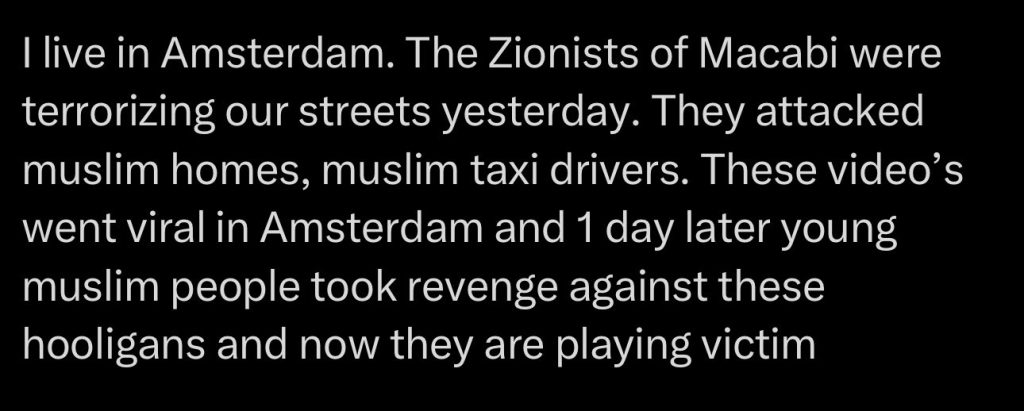The recent clash between Ajax and Maccabi Tel Aviv supporters in the Netherlands has been largely misrepresented by mainstream outlets, which frame the violence as unprovoked attacks on Maccabi Tel Aviv fans. In reality, eyewitness accounts and local reports indicate that the altercations were triggered by a provocative series of actions by some Maccabi supporters.

How Maccabi Tel Aviv fans behaved, in the minute silence to remember the flood victimspic.twitter.com/WuhDstIfxP
— Esheru (@EsheruKwaku) November 8, 2024
⚡️IMPORTANT: This is what Maccabi Tel Aviv Hooligans did in the Netherlands that triggered all the violence against them after the authorities did nothing, don’t let anyone twist it.
— Suppressed News. (@SuppressedNws) November 8, 2024
Israelis are not the victim.
They took down Palestine’s flag and then it all started.
An… pic.twitter.com/NaP3x0Pl9z
⚡️BREAKING: Israeli PM Netanyahu announces that Israel is sending two 'rescue planes' to Amsterdam after reports of dozens injured.
— Suppressed News. (@SuppressedNws) November 8, 2024
The Mossad and Shin Bet are urgently sending agents into the streets of the Netherlands under the direction of the Ministry of Foreign Affairs,… https://t.co/gIe4BWWhe0 pic.twitter.com/UP7j1odnKH
According to one witness, the violence erupted when Maccabi Tel Aviv fans forcibly removed a Palestinian flag displayed on a building façade. What followed was a surge of aggressive behaviour from some Israeli fans, who not only destroyed a taxi driver’s car but also physically assaulted the driver. Other Maccabi supporters were reportedly armed with metal chains, appearing ready for confrontation.
⚡️BREAKING: Maccabi Tel Aviv hooligans are getting attacked right now in the Netherlands after ignoring the minute of silence for Valencia victims and singing racist chants about extermination of Arabs.
— Suppressed News. (@SuppressedNws) November 8, 2024
Dutch Moroccans are making them aware that this isn’t Israel. pic.twitter.com/LKJEkgHgLu
Tensions escalated further during the match itself, when Maccabi Tel Aviv supporters reportedly refused to participate in a minute of silence held in honour of the recent Valencia flood victims. They then allegedly launched illegal fireworks and chanted inflammatory, racially charged songs calling for the extermination of Arabs. The chants, some Maccabi fans shouted, referenced the controversial line, “There are no schools in Gaza because there are no children left,” a statement that echoes the genocidal rhetoric often condemned by international human rights organizations. Protected by local police, these fans acted with apparent impunity, which only further stoked anger from local Dutch Moroccans and other attendees who saw this as a blatant disrespect to the host nation and its values.
More footage – Source @yassienee, @YounessOuaali pic.twitter.com/l20xe2plGI
— Suppressed News. (@SuppressedNws) November 8, 2024
Despite the gravity of these incidents, corporate media and Western politicians have been notably silent or one-sided in their coverage, casting Maccabi Tel Aviv fans as victims while largely omitting these provocations. Many argue that this reluctance to present a balanced view is symptomatic of a wider political sensitivity surrounding any narrative critical of Israel or its citizens. The powerful influence of pro-Israel lobbying groups and a fear of backlash often deter media outlets and public figures from acknowledging or investigating actions by Israeli nationals that may contradict the prevailing narrative of victimhood.
Just to clarify this is why they are getting attacked: https://t.co/ArhXii0gj5
— Suppressed News. (@SuppressedNws) November 8, 2024
⚡️BREAKING: Maccabi Tel Aviv hooligans are getting attacked right now in the Netherlands after ignoring the minute of silence for Valencia victims and singing racist chants about extermination of Arabs.
— Suppressed News. (@SuppressedNws) November 8, 2024
Dutch Moroccans are making them aware that this isn’t Israel. pic.twitter.com/LKJEkgHgLu
More footage – Source @yassienee, @YounessOuaali pic.twitter.com/l20xe2plGI
— Suppressed News. (@SuppressedNws) November 8, 2024
The reluctance of corporate media to cover these incidents fairly highlights a broader issue: the hesitancy to report on Israeli actions in a way that could provoke political backlash or accusations of anti-Semitism. This bias underscores a broader trend in which Western powers and media selectively report incidents, shaping public perception in favour of certain political narratives while disregarding others, regardless of the evidence at hand.
Don’t Believe The Zionist’s Lies!
A pogrom?? Go fuck yourself.
— Amanda Gelender🔮 (@agelender) November 8, 2024
I’m Jewish & live in The Netherlands & am proud to see the complete & total rejection of fascist Nazi Zionism in our streets.
There’s an *actual* Zionist holocaust against Palestine right now & per usual, Zionists are committed to playing the victim pic.twitter.com/ZHZZksgu7B





